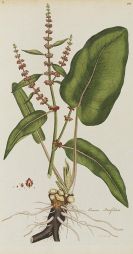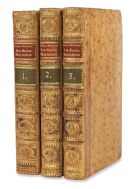
Friedrich Justin Bertuch
Weimar
1747 -
Weimar
1822
Johann Friedrich Justin Bertuch was born in Weimar in 1747. Following the death of his parents – his mother had abandoned him when he was 5, and his father left him when he was 15 - Bertuch was raised by his uncle. Between 1765-69, he studied theology, and, subsequently law, at the State University in Jena, although his main interests were literature and the natural sciences. He finished his studies early when he was 22, to work as a tutor at "Gut Dobische" under Baron Ludwig Heinrich Bachoff von Echt. The Baron taught him Spanish, and, between 1755-77, after returning to Weimar, Bertuch translated "Don Quixote" into German.
In Weimar, Friedrich Justin Bertuch administrated the Duke’s private finances until 1796, as well as taking other roles within state office. He was a commercial employee at Christoph Martin Wieland’s newspaper, "Teutscher Merkur" and attempted to launch himself as a freelance writer, but achieved more success as a translator, publisher, businessman and organiser. The ideas of the Enlightenment and a high level of social engagement shaped his activities.
In 1774, Bertuch conceived a concept for a drawing school in which students would be supported according to their abilities, rather than their social background. His idea was realised, and Johann Heinrich Meyer, and subsequently Goethe later ran the school. Until the outbreak of war in 1806, Friedrich Justin Bertuch edited the "Allgemeine Literatur-Zeitung", the "Journal des Luxus und der Moden", various natural history texts, geographical maps, and a series of childrens’ books. His diverse publishing company became a cultural institution in Weimar.
Friedrich Justin Bertuch regarded himself as a "literary obstetrician" and supported the young Goethe, amongst others. Alongside his publishing company with its paper mill and printers, Bertuch also built a factory for paper flowers and an "Industry Comptoir". Bertuch became one of the largest employers in Weimar, employing up to 450 people, whom he paid above average wages. After 1806, Bertuchs worked in a crisis-ridden period. From 1814, he also published political newspapers and magazines, such as "Nemesis" and "Das Oppositionsblatt".
Johann Friedrich Justin Bertuch spent the last years of his life as a recluse, and died on 3rd April 1822.
Would you like to sell a work by Friedrich Justin Bertuch?
Infos for seller



